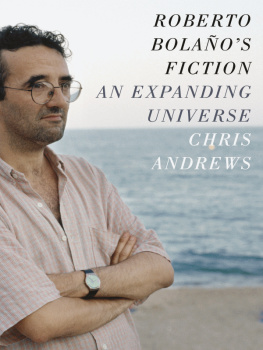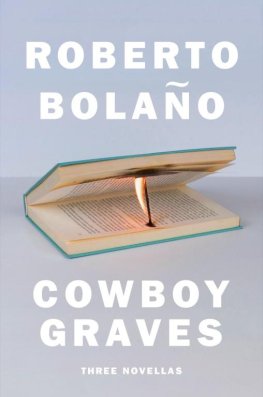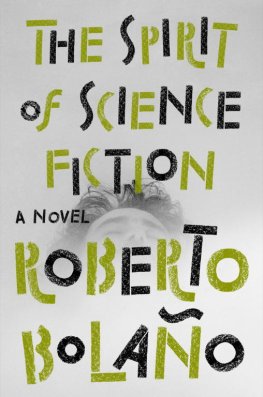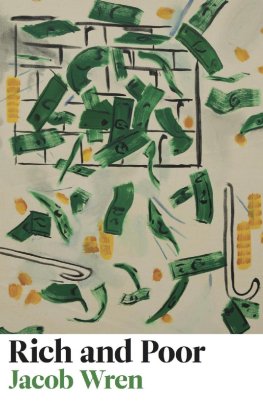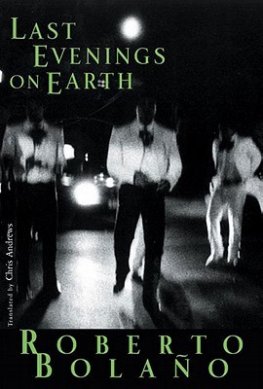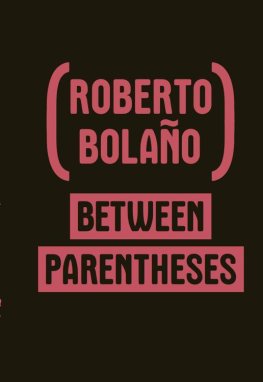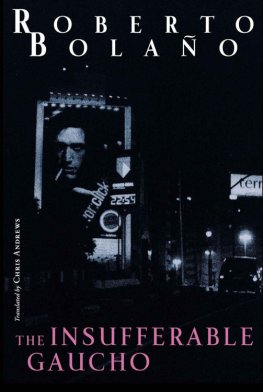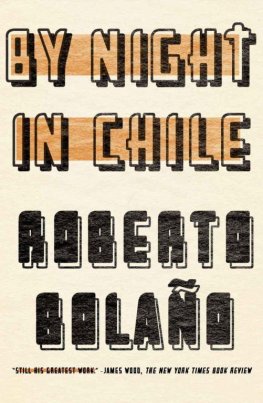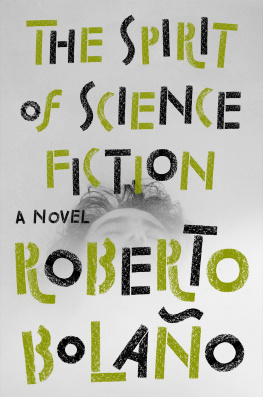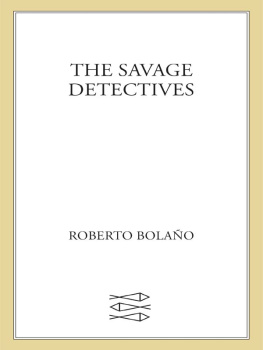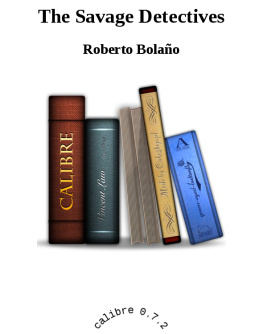ROBERTO BOLAOS FICTION
CHRIS ANDREWS
ROBERTO BOLAOS FICTION
An Expanding Universe
Columbia University Press / New York
Columbia University Press
Publishers Since 1893
New York Chichester, West Sussex
cup.columbia.edu
Copyright 2014 Columbia University Press
All rights reserved
E-ISBN 978-0-231-53753-7
Library of Congress Cataloging-in-Publication Data
Andrews, Chris, 1962-
Roberto Bolaos fiction : an expanding universe / Chris Andrews.
pages cm
Includes bibliographical references and index.
ISBN 978-0-231-16806-9 (cloth : alk. paper) ISBN 978-0-231-53753-7 (electronic)
1. Bolao, Roberto, 1953-2003Fictional works. I. Title.
PQ8098.12.O38Z55 2014
863'.64dc23
2013039656
A Columbia University Press E-book.
CUP would be pleased to hear about your reading experience with this e-book at .
Cover design: Frances Baca
Cover image: Anna Oswaldo Cruz 1998
References to websites (URLs) were accurate at the time of writing. Neither the author nor Columbia University Press is responsible for URLs that may have expired or changed since the manuscript was prepared.
CONTENTS
I AM VERY grateful to the Australian Research Council for the Discovery Project Grant that supported the writing of this book. I would also like to thank Philip Leventhal of Columbia University Press for his early interest in the project and his guidance, Leslie Kriesel for her perspicacious editing, Victoria Baker for the thought she put into the index, Luciana Scocco for her resourceful research assistance, and Masako Ogawa for finding and translating commentary on Bolaos fiction in Japanese.
Many friends and colleagues have helped me in various ways, with their questions, comments, conversation, invitations, hospitality, and encouragement. In particular I would like to thank Esther Allen, Dina Al-Kassim, Robert Amutio, Karim Benmiloud, Hugo Bowne-Anderson, Susan Bernofsky, Sara Castro-Klaren, Jing Luciana Chen, Wilfrido Corral, John Culbert, Ignacio Echevarra, William Egginton, Barbara Epler, Ignacio de Ferrari, Ivor Indyk, Gail Jones, Ignacio Lpez Vicua, Celina Manzoni, Bruno Montan, Christian Moire, Fernando Moreno, Alfonso Montelongo, Carmen Prez de Vega, Carmelo Pinto, Sarah Pollack, Cristina Rocha, Rodrigo Rojas, Jos Ramn Ruisnchez, Samuel Rutter, Natalie Saint-Martin, Manuel Vicua, Natasha Wimmer, Oswaldo Zavala, Danielle Zaslavsky, and the two anonymous reviewers for Columbia University Press. My deepest debt of gratitude is to Michelle de Kretser, who suggested that I write this book in the first place, and whose eye for hitches at all levels has improved it greatly. The remaining mistakes are down to me.
Material from a number of articles has been reworked for inclusion here, and I am grateful to the editors and presses for permitting separate publication:
Algo va a pasar: Los cuentos de Roberto Bolao. In Roberto Bolao: Una literatura infinita, ed. Fernando Moreno, 3340. Centre de recherches Latino-amricaines/Archivos, Universit de PoitiersCNRS: Poitiers, 2005.
Varieties of Evil. Meanjin 66, no. 3 (2007): 200206.
La experiencia episdica y la narrativa de Roberto Bolao. In Bolao salvaje, ed. Gustavo Favern and Edmundo Paz Soldn, 5371. Barcelona: Candaya, 2008.
Bolao y la incertidumbre. In Fuera de quicio: Bolao en el tiempo de sus espectros, ed. Ral Rodrguez Freire, 249254. Santiago: Ripio, 2012.
T HIS IS A book of literary criticism. Although I have had the lucky privilege of being one of Roberto Bolaos translators, translation will not be my main concern in the following pages. And although Bolao responded to my queries in the last year and a half of his life, I have no biographical revelations to offer. These opening disclaimers made, I would like to comment briefly on the ways the critical approach adopted here is relatedindirectlyto the work of translation and to the life of the author studied.
A translator is, by necessity, a slow reader and a rereader, which is not to say a model reader in all respects, for there are features of a literary work that a translator may not be in the best position to see, simply because he or she is so close to the text and proceeding so slowly through it, except in the final revising. This closeness and slowness can, however, confer a special perspective, because they counteract the readers natural tendency to hierarchize the contents of a text, privileging plot over subplot, or protagonists over minor characters, or action over atmosphere. Translators, I have noticed, are sometimes haunted by quiet places in a narrative that may seem unremarkable both to general readers, absorbed in the story, and to academic critics, who understandably focus on the aspects of a text that are relevant to their guiding hypotheses. Because translators are obliged to distribute their attention evenly, they spend considerable amounts of time on passages that other readers may hurry through, and in those stretches of textual noise they may begin to discern or construe messages. The hypotheses that guided this study were no doubt shaped to some degree by a desire to formulate and organize the messages emitted, as it seemed to me, by inconspicuous recesses of Bolaos work in which I had lingered as a translator. But my discussion is not limited to the books that I translated; it ranges over the interconnected series of narratives that begins with Nazi Literature in the Americas (originally published in 1996) and ends with the stories that appeared posthumously in The Secret of Evil. These narratives can be regarded as forming a single, openly structured edifice whose two sustaining pillars are The Savage Detectives and 2666, and for which Woes of the True Policeman served as a preparatory model.
My second opening disclaimer was that I had no biographical revelations to offer. I would, however, like to echo the testimonies of others who came into contact with Roberto Bolao in the final years of his life.; but in Bolaos case author and writer have much in common, and to be curious about the relations between them is not necessarily to be under a nave illusion.
Rather than reconstructing the life from which Bolaos works emerged or scrutinizing what happened, linguistically, when they crossed from Spanish into English, I will be concentrating here on the published fiction itself and asking how it was (and is) composed, how it manages narrative tension, how Bolaos characters experience their selves in time, how they damage and protect one another, and what ethical and political values are implied by their interactions.
Those are the books central questions, and the answers to them occupy , where the work of textual analysis really begins.
). Bolaos work is not neatly designed; it sprawls, but it has a deep and intricate coherence, which will be reflected by the internal references in this book.
, but the meaning of each can be roughly indicated here in a sentence. Bolao expanded or exploded his own published texts, blowing them up by adding new characters and episodes as well as circumstantial details. He also allowed characters to circulate or migrate from text to text, sometimes altering their names and properties. Within his novels and stories, he included representations of imagined texts and artworks, that is, metarepresentations. Finally, some of his characters and narrators are overinterpreters: they seize on details, invest them with significance, and invent stories to connect and explain them. These four processes do not operate as constraints; in fact, Bolao uses some of them to relax the realist conventions requiring consistency in characterization and psychological plausibility in behavior, and this gives his fiction-making system (as Nora Catelli has called it) an unusual degree of free play.

